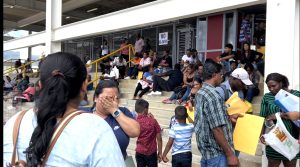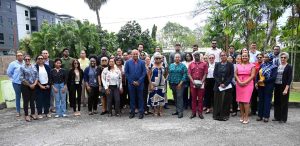By Sue-Ann Wayow
FOR the year 2002, five Caribbean countries including Trinidad and Tobago recorded homicide rates of more than 30% per 100,000 inhabitants.
This is over five times the global average says Chairman of Caricom Prime Minister of The Bahamas Philip Davis, KC.
Out of the five, Jamaica has the highest homicide rate of 52.9% per 100,000 inhabitants with Trinidad and Tobago following second with a rate of 39.4% per 100,000 persons.
The Bahamas, St Lucia and St Vincent and the Grenadines all recorded homicide rates above 30%, Davis stated on Monday at the regional symposium to discuss crime as a public health issue.
The symposium is being held at the Hyatt Regency Hotel in Port of Spain.
Davis said the majority of crimes committed were done using an illegal firearm which at most times was traced back to the United States.
“The guns used in approximately 70% of violent crimes do not originate in our countries,” he said.

He called on the US to assist with the reduction of the illegal transportation to the Caribbean countries as the Caribbean nations do not manufacture their own guns.
Disclosing additional statistics, he said in the Bahamas, 98.6% of all recovered illegal firearms could be traced directly to the US. In Haiti- 87.7%, in Jamaica – 67% and in Trinidad and Tobago, 52% of illegal firearms could be traced back to America.
Davis said, “We have asked the US government and US-based gun manufacturers, to co-operate with Caricom member states when it comes to identifying weapons purchased in the US as a part of the wider effort to hold weapons dealers and manufacturers and traffickers accountable for the many lives lost to gun violence each year.”
He added, “We must call on our neigbours to the north to better police the trafficking of guns from the US to the Caribbean.”
Davis said that The Bahamas, Trinidad and Tobago, as well as Antigua and Barbuda, Belize, Jamaica, St Vincent and the Grenadines signed on to a US$10 billion anti-gun lawsuit filed by Mexico in the US last month.
The lawsuit contends that US gun industry practices, including the bulk sales of guns to dealers who are known to engage in practices correlated with illegal weapons smuggling, have caused significant harm to the countries in the Latin America and Caribbean region as reported in the Caribbean Insight.
Davis said, “We intend to challenge the laws that previously protected gun manufacturers from lawsuits.”
He said, “We are sending a clear message to the world that we are very serious about fighting gun violence in all forms and all fronts.

Davis also said that violence was contagious and that those who come in close contact with violence were most likely to spread it and also most likely to fall victim to it.
He said, “Caricom has embraced the view of violence as a public health crisis requiring comprehensive interventions to battle an epidemic that has claimed far too many lives. As we would with any public health crisis, we must define and monitor the problems, identify the risks and protect the factors and develop mitigation and prevention strategies to halt the epidemic.”
Data suggests that an average of 30 persons between the ages of 16 to 30 lose their lives to violent crime in the region, Davis said and emphasis must be placed on discouraging young people from a life of crime.
Resources must also be allocated to address the social aspect of violence.
Davis said, “The battle is a complex one. There is a tangle of social, economic and environmental factors at the heart of this crisis.”
Focus must be placed on untangling the issues which were not merely legislative, policing or judicial.
“We need all hands on deck,” Davis said.
And referring to research by Bahamian psychiatrist and consultant, Dr David Allen, Davis said that Dr Allen, in his most recent research has linked the physical and sexual abuse of children to physical, mental and psychological illnesses later in life.
“Many of these children grow up to be the perpetrators and victims of further violence….Dr Allen concludes
![]()












